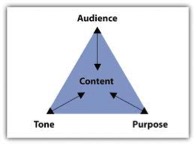- Home
- About Us
- The Team / Contact Us
- Books and Resources
- Privacy Policy
- Nonprofit Employer of Choice Award

What writing tasks do you have on your "to do" list - a thank you to a valued donor, a direct mail letter launching a new fundraising appeal or perhaps updates to your case for support?
What's holding you back? Does sitting down to a blank white screen fill you with dread?
It doesn't have to.
Here are three simple tips to eliminate writer's block and get over the procrastination hurdle.
If you're writing without thinking, you're actually just typing.
I remember how, in my university years, I would often leave essay writing until the last minute. Procrastination? Yes, sort of. But the problem wasn't in doing the actual writing. The problem was feeling confident in the subject matter: knowing what I wanted to say, why I wanted to say it and how I wanted to structure my argument.
You can't write a compelling story/article/letter if you haven't fully researched the details of the subject matter. You won't engage your reader on an emotional level unless you articulate to yourself (or others) the type of response you are trying to create.
Any writing that you do should begin with thinking or analysis. In fact, writing can be an aid to the act of thinking. The two acts are intertwined. Though not all thinking is done in writing, all good writing involves thinking.
Know thy audience
You will have a very difficult time putting words on paper if you don't know the audience you're writing for. In the writing pyramid, audience is always at the top.
.
Knowing your audience will help you to determine the style of your writing piece, beginning with tone and voice.
It also helps to understand whether your audience is motivated to read what you are writing. While you can't take anything for granted, there are general assumptions that can be made about your audience based on the level of engagement that person has with your organization. For example,
Find your process
As with so many skills, the more writing you do - the better you will get at it. Understanding your process will help you, not only start, but reach the finish line with your writing.
What do I mean by process?
Find the right environment to get your creative thoughts flowing. Do you work best in the early morning when the house/office is quiet? What about at a bustling coffee shop surrounded by the energy of strangers? Prefer to close your door mute all notifications? There is no wrong way to write. You just need to find the best way for you to find your voice.
Resist the temptation to edit as you go. Too often we begin editing ourselves before words collect on the page. Instead, set small goals. Finish one page before re-reading and editing. Is one page too much? Start with two paragraphs. Usually somewhere around page 2 I hit my stride and end up deleting the whole first page where I started - but that's my process.
Other things to consider when it comes to process:
If you think and plan your writing, identify your audience and work your process - will writer's block still happen? It might. But in the words of Stephen King, "the scariest moment is right before you start. After that, things can only get better."
Lisa MacDonald has been wrestling writer's block for years. It hasn't beaten her yet! Contact her at lisa@hilborn.com.
Photo byKenny Eliason on Unsplash